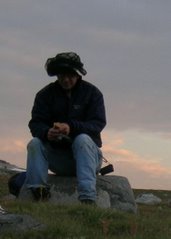
I have a weblog in Yahoo Geocities that’s resided there since 2000.
Tonight I was watching Stewart (Daley Show) and Moyers on PBS yakity yaking, and Stewart on the day of the Virginia sadness did an interview of an Iraqi who had written a book about Iraq’s sadness. Now Stewart was struck by our reaction to the student’s deaths, and enquired how the Iraqis are responding to the daily massacres there.
He may well have thought to ask an Auschwitz survivor how they dealt with the day to day.
Anyway, Stewart wrestled with thoughts I had explored in my Panay weblog, which I quote from here:
Tonight I was watching Stewart (Daley Show) and Moyers on PBS yakity yaking, and Stewart on the day of the Virginia sadness did an interview of an Iraqi who had written a book about Iraq’s sadness. Now Stewart was struck by our reaction to the student’s deaths, and enquired how the Iraqis are responding to the daily massacres there.
He may well have thought to ask an Auschwitz survivor how they dealt with the day to day.
Anyway, Stewart wrestled with thoughts I had explored in my Panay weblog, which I quote from here:
quote
update: July 10, 2014...the link doesn't link to the weblog anymore...maybe I can find the old disk with it, and make another...there's plenty now on the web...just google: USS Panay
Introduction:
Dear reader,
Reader seems kinda stuffy, how about Webizen!
The web's an irreverent place, and maybe irrelevant too at times, which is how I feel making things for it--an irreverent irrelevant! And I'm being more lighthearted here about a subject that is solemn than maybe I should. If you are familiar with the Panay Incident, and Nanking, and all that happened in China then, as a student of history you know what I'm hedging about.
Initially, I set out to write about the Panay as a subject for a project assignment at a local community college. My task was to make a four page booklet to familiarize myself with offset printing. My goal was to see how things go from computer to print. Those steps when the data becomes film, film becomes plate, plate goes through the printing machine, were something of a mystery. The subject of the project was unimportant, it could be anything a student chose. The focus was on the process. So out of the blue, sorta, I picked the Panay.
I had read about the Panay years before. What lodged in my head was the tale of a little ship that was bombed by the Japanese way before Pearl Harbor, and became notorious as a foreshadowing of World War 2. My mind's eye recalled the story happening in the harbor of some Chinese city that was being bombed by the Japanese, and an errant pilot, deliberately or accidentally, bombed the Panay.
Well, clearly I had forgotten a lot of the details of the story I read. It was Perry's magazine story in American Heritage. But the ghist I had was probably as much as anyone does who even knows about the Panay.
But in December of 1999 I saw in the newspaper a notation about the Panay, one of those "This day in history..." "On December 12, 1937, the USS Panay was bombed." And I thought, that's nice, some journalist remembering the Panay. And at the time I was following the war in Yugoslavia, and the bombing of the Chinese Embassy. That bombing, I thought, was a little like the Panay upside down. We made the mistake, we made the apology, we paid the retribution. But we, America, aren't the Japanese in 1930's China. I'm certain of that myself, but I can see where a billion Chinese might not agree. And if the machination of the CIA make you cringe, then don't feel alone, as there are likely many Americans in sympathy. Oddly, the CIA, according to one source, got its start in China of this time. But more on that later...
So, I announce to the class that my project subject was the Panay, and I went off to the library. I found Perry's book easy, and old microfilms of London Times telling the story easy. At 53 I still start fishing in the library catalog and Reader's Guide to Periodical Literature-- the old fashioned way. But in the library too were banks of computers and I'm familiar with going online, being an old GEnie webizen, and I started using the search engines. I hadn't really used the web since it's inception. What a marvel! Needless to say, my Panay subject took on new dimension.
Here, I might announce, anyone who has ever written about the Panay before needs to do it all over again! And you know, that may hold true for all the history stories. The web fills everything out. People who have the first hand stories, the old photos, the letters, the governments that have the archives, just all kinds of things, are being made available on the web.
Quickly, for me, the focus of my Panay project went from the process to the content. The class is over now, the four page booklet made (best I could anyway!), and I'm still studying the Panay.
Why is it so engrossing?, you might ask here. Well, I hadn't realized that that "Chinese city" was Nanking. As one author puts it, the fall of Nanking on December 12, 1937, dwarfed the bombing of the Panay. Heck, it dwarfs everything. It's Hiroshima, a Nagasaki, an Auschwitz--the fall of Nanking was a holocaust--China of the thirties and forties was a holocaust.
There has always been something disproportionate about America's story telling. The story of the Panay in the 1937 media far outweighs the story of Nanking. And that hasn't changed much, the story of one lost plane got more media coverage of the Yugoslavia raids then it likely deserved. And what I mean by "deserved" is that history needs to be told as proportionally as possible. Otherwise, no one knows what really happened. An unbalanced telling of history isn't lying, or covering up, the Japanese still don't want to talk or hear about Nanking and the rest, anymore than America wants Hiroshima presented as the wrong thing to have done. Nations do that sort of thing, just like individuals. Dwelling on the awful, is, well, awful, and folk everywhere avoid it if they can. And heroic stories of one downed pilot, or one small ship in a far away land, are, simply, what we recall on Memorial Day. But the truth, somehow, has to be available, and there in the history stories for those who seek it, as student's, as soldiers, as politicians, as anyone for whom truth matters. And it's never easy to find out what really happened for any event, no matter how recent.
What is usually out of whack, is the proportions. We call the Panay bombing an Incident, Japan refers to the whole China campaign, as an Incident. And out of whack proportions can wreck havoc with history telling. Here I might refer to Robert Graves' poem, "The Persian Version"*. And America's storytelling, because of the disproportions, doesn't tell the truth. It just doesn't. America tells stories, very good ones, but they are not proportional to the history that made them.
And since I got started in on this Panay project, that has been my simplest goal, to get the proportions right.
Unquote
I hadn’t thought to link up to my other web writings here, and it’s not likely in the progress of this Tree in the Door Blog I will refer to them. They were done when they were done, and belong where they are…this is something different. But the link above takes one to the Panay Project Weblog, and a search of Google Groups: dsharpness, will turn up my posts there, mostly in the jfk group. Panay led to JFK. Sort by oldest date first in that group and the over three hundred posts I have will read in a kindof story fashion. Three hundred is nothing compared to the other posters there! With the JFK posts I needed editorial tension which the moderators provided, and the other people who post there. I think they know I appreciate that, and it was a reciprocal kindof thing. That’s the big plus of the google groups at it’s best, the interplay. But at it’s worst, which is it’s most common state!, it’s just a wall of graffiti.
I’ve probably gone as far with JFK as I can, but will add someday to the Panay Weblog.
Remember the Panay
David
Yosemite
April 27, 2007
...........*The Persian Version..........
Truth-loving Persians do not dwell upon
The trivial skirmish fought near Marathon.
As for the Greek theatrical tradition
Which represents that summer's expedition
Not as a mere reconnaisance in force
By three brigades of foot and one of horse
(Their left flank covered by some obsolete
Light craft detached from the main Persian fleet)
But as a grandiose, ill-starred attempt
To conquer Greece - they treat it with contempt;
And only incidentally refute
Major Greek claims, by stressing what repute
The Persian monarch and the Persian nation
Won by this salutary demonstration:
Despite a strong defence and adverse weather
All arms combined magnificently together.
The trivial skirmish fought near Marathon.
As for the Greek theatrical tradition
Which represents that summer's expedition
Not as a mere reconnaisance in force
By three brigades of foot and one of horse
(Their left flank covered by some obsolete
Light craft detached from the main Persian fleet)
But as a grandiose, ill-starred attempt
To conquer Greece - they treat it with contempt;
And only incidentally refute
Major Greek claims, by stressing what repute
The Persian monarch and the Persian nation
Won by this salutary demonstration:
Despite a strong defence and adverse weather
All arms combined magnificently together.
Robert Graves
Majorca
Well...forgot to post up yesteday, Remember the Panay, though Panay and the Related Matters were in my thoughts...David, 12/13/09



No comments:
Post a Comment